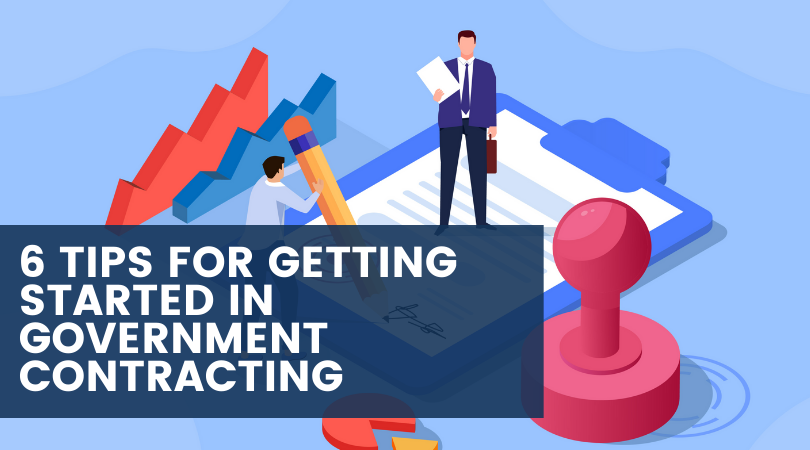
Editor's Note: This post was initially published in April 2021 and has been updated for accuracy and comprehensiveness.
Federal contracting is an excellent way for businesses to open a new revenue stream. That's because, as a customer, the federal government is one who:
- Actively looks to work with small businesses
- Is guaranteed to have the funds to pay you
- Spends more in times of recession
- Wants to build long-term working relationships with reliable vendors
So how do you even approach working with the world's largest buyer of goods and services?
That's what this blog post is going to cover.
Here, we'll go over the following:
- Registration in SAM
- Small Business Set-Asides
- Opportunity Research
- Past Performance
- Subcontracting
- Building Relationships
Plus, at the end of this post is a FREE downloadable guide that will teach you the fast and easy way to get started in federal contracting.
Let's begin.
Registration in SAM
The American taxpayer funds federal contracts. With that in mind, a lot of accountability is needed for how this money is spent and on whom it's being spent.
To keep track of all of its vendors, all federal contractors must register in the System for Award Management, commonly known as SAM.
SAM is a database containing information on all businesses working with the federal government, such as location, small business status, business type (determined by their North American Industry Classification System or NAICS code), and much more.
The important thing you need to know now is that without registration in SAM, you cannot bid on and perform government contracts.
It's as simple as that.
So how does one get registered in SAM?
There are two main ways you can get your business in compliance for federal contracting:
- Registering yourself in SAM
- Outsourcing the process to a third-party
Registering Yourself in SAM
Registering your own business in SAM is free... in the same way that doing your taxes is free. Before proceeding, it's best to read up on the required information you must submit for the registration, properly format the mandatory notarized letter, and ensure every detail is accurate.
That's because if there are any errors on your SAM registration, you may face the following:
- Rejection, resulting in costly delays
- Delays in payments on work that you have already performed
- Fines for misrepresenting your company (even if it was unintentional)
If you take the DIY route for registering in SAM, ensure you do your homework and know what you're doing.
Outsourcing the Process to a Third-Party
As mentioned earlier, you can either handle your business's taxes or hire a professional to take care of them.
The same principle applies to your SAM registration.
USFCR's SAM Assistance Service provides benefits such as:
- Professional and timely SAM assistance
- Set-aside qualification
- Dynamic Small Business Search (DSBS) optimization
- Case manager support
Small Business Set-Asides
Another important factor to consider when working with the federal government is small business set-asides.
What is a small business?
This might seem like a basic question with an arbitrary answer. However, before we get into small business set-asides, we must cover who the federal government considers a small business.
Luckily, for federal contractors, the government's answer has specific requirements.
First, your small business status is decided by your industry, which is determined by your primary North American Industry Classification System (NAICS) code.
There's a NAICS code for everything, ranging from tortilla manufacturing (311830) to uranium mining (212291).
Then depending on your NAICS code, your small business status is determined by either your:
- Employee headcount
- Yearly revenue
To get started on determining your small business status, you can check out this chart created by the Small Business Administration (SBA).
What are small business set-asides?
Every year, the federal government spends over $600 billion on contracts. By law (the Federal Acquisition Regulation or FAR), they have to try to spend at least 23% of that sum on small businesses.
Then, there are spending goals for specific types of small businesses, which include:
- Women-Owned Small Businesses (WOSBs)
- Service-Disabled Veteran-Owned Small Businesses (SDVOSBs)
- Historically Underutilized Business Zone (HUBZone) Small businesses
- Small Businesses enrolled in the 8(a) Program
What are the benefits of these set-asides?
In the most basic sense, being registered as a small business and, specifically, one of the groups above boosts your chances of winning a federal contract.
The government employs three methods to ensure their annual contracting budget gets distributed to small businesses and various set-asides.
- Creating exclusive bidding opportunities (for example, an HVAC contract that can only be bid on by SDVOSBs)
- An increased incentive for agencies to hire set-aside designated businesses to reach their spending goals
- Increase incentives for prime contractors to work with small business subcontractors.
A SAM registration will get you in compliance for federal contracts, but registering for a federal set-aside can significantly improve your chances of winning.
Opportunity Research
Finding opportunities to bid on is arguably the most important skill you can have as a federal contractor. You won't go anywhere in this sector without knowing how to use existing systems to find a job that your business can perform and perform well on.
Using SAM
As mentioned earlier, acting as a database for all federal contractors is just one of the many functions of SAM.
It also works as a search portal for government contractors to find opportunities.
The Advanced Procurement Portal (APP)
USFCR offers its own contract search platform that can also help you gather data on potential buyers and competitors and manage your contacts called the Advanced Procurement Portal (APP).
SAM has been integrating several government procurement-related databases into one platform for the past few years. APP already has these databases synced into it, plus it was designed for maximum ease of use.
Plus, with APP comes a learning center with contracting templates to help you learn the federal sector from the ground up.
Past Performance
Past performance is one of the most important factors that can make or break your endeavor in federal contracting.
So what exactly is it?
In short, your past performance rating is like your report card for how well you did on a government contract. Like a report card, the better grades (or rating) you get, the more opportunities will open up down the line.
The government does this to keep track of reliable vendors and avoid vendors who are likely to fail on a contract.
One of the paradoxes of past performance is that to boost your chances of winning a contract, you need past performance; however, to get past performance, you need to win a contract.
How does one work their way around this predicament?
One of the most common routes, especially for small businesses, is subcontracting.
Subcontracting
As mentioned before, the government sets out to spend a predetermined sum of its contracting budget on small businesses. One of the methods they employ is setting small business subcontracting goals for larger contracts.
This means prime contractors, much like federal agencies, have an incentive/requirement to work with small businesses.
Besides getting work for your business, one of the benefits of subcontracting is that it counts toward your past performance rating with the federal government.
There are fewer administrative responsibilities since these matters are handled between you and the prime contractor instead of a federal agency.
Building Relationships
Federal agencies want to build long-lasting working relationships with reliable vendors. As a new vendor, it is critical that you are proactive with building lines of trust and familiarity with contracting officers.
Being timely, knowledgeable, and building your network is just as important in the federal space as working with the public sector.
What's also worth noting is that much like the private sector, the federal government will host events to engage with potential business partners. For example, USFCR client Pacific Continental Textiles Inc. attended a Defense Logistics Agency (DLA) Joint Advanced Planning Brief for Industry meeting to meet potential buyers.
Several months later, they won their first contract valued at $166,000.
Technical aspects such as registrations and searching through databases are essential for government contractors.
However, it is crucial to recognize the power of building relationships with potential buyers and prime contractors.
FREE Guide to Getting Started in Government Contracting
In this blog post, we took a general overview of how you can get the best possible start in government contracting.
However, if you want to take it a step further and get a more detailed, step-by-step guide for getting started, we have a FREE guide for you.
To speak with a Registration and Contracting Specialist, Call: (866) 216-5343
Originally published Apr 23, 2021, 10:35:04 AM, updated June 2023


